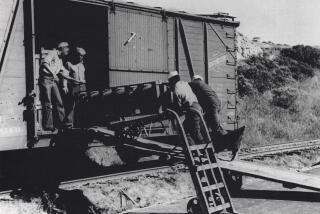Russia Hands Over Files on U.S. POWs
- Share via
MOSCOW — Their last names were Russian, Ukrainian and Jewish. They were all U.S. citizens but had no way to prove it. And when the advancing Red Army freed the German prisoner-of-war camps where they were held, the Soviet secret police took them away as suspected “enemies of the people.”
More than 70 American soldiers disappeared this way into the gulag of Soviet dictator Josef Stalin at the end of World War II.
Some eventually were released and over time made it back to America. A number were shot as “traitors to the motherland,” and others died in the gulag’s remote and harsh penal colonies. The fates of many remain a mystery to their families even today.
On Friday, Russian officials acknowledged that the NKVD, as the Soviet security and intelligence agency was known at the time, sifted through more than 22,000 American soldiers held in the German POW camps liberated by the Red Army in 1944 and 1945 in search of men who had fought with a renegade Soviet general, Andrei Vlasov, for the Nazis.
“Those who had Russian or Ukrainian or Jewish names were taken away for interrogation, while the vast majority of American soldiers were repatriated immediately,” said Col. Gen. Dmitry Volkogonov, a defense adviser to President Boris N. Yeltsin. “The NKVD believed they were Vlasov’s men, traitors to the motherland . . . and they were imprisoned or even worse.”
Volkogonov, a leading military historian, provided details Friday of the cases, including records on eight American GIs who died in the camps, to the new Russian-American commission on prisoners of war and soldiers reported as missing in action during World War II, the Korean War and the Vietnam War.
“A few years ago, this commission would have been impossible,” Volkogonov, its co-chairman, said, “because the U.S. government, in response to all requests about its citizens held here, would have been told there had never been any U.S. nationals held prisoner on Soviet territory.
“We know full well now that a number of U.S. citizens were, for one reason or another, imprisoned in the Soviet Union. And the very agreement of the Russian government and the Russian president to discover the fate of these Americans is proof that Russian-American relations have changed.”
The impetus for the commission, which completed its first meeting here Friday, stemmed largely from the strong U.S. desire for any information that Moscow might have, as a result of Soviet backing for the Vietnamese Communists, on American servicemen listed as missing in action during the Vietnam War.
But the commission’s terms were drawn broadly, and Malcolm Toon, the U.S. co-chairman and former American ambassador to Moscow, said: “The pain of not knowing what happened to your husband or son or brother might be dimmed, but it is not erased by time. . . . It’s important to learn everything we can.
“We can also see that this is the beginning of a real honesty between us, admitting what really happened but was hidden for so many years.”
Most of the disclosures during the two-day session were intended as tokens of each side’s goodwill.
Toon handed over identification tags and files of two Soviet officers, a general and colonel, imprisoned by Germany and killed; the material was found during a recent check of the National Archives in Washington.
Volkogonov spoke of U.S. sailors who deserted during the Vietnam War and, with the help of Soviet intelligence agents, made their way from Japan to Moscow where, as he put it, “they were used for a propaganda show.”
“Attempts were made to recruit them (for Soviet intelligence), but our records show they left the Soviet Union,” he added. “This will have to be rechecked and verified.”
Toon had also provided information, including photos, on Soviet soldiers held by Afghan rebels and promised U.S. assistance in obtaining their freedom even though Washington’s influence with the moujahedeen , as the rebels are called, has diminished with the halt of U.S. arms shipments to them.
Toon said the commission had discussed the U.S. servicemen missing in Vietnam, including reports that some American prisoners had been interrogated by Soviet intelligence, but was just beginning its work in an admittedly sensitive but confused area.
The commission will meet again in late May after an initial search of archives, interviewing of witnesses and visits to grave sites and other locales. The commission includes several members of the U.S. Congress and the Russian Parliament as well as diplomats, historians and military and intelligence officers from both countries.
More to Read
Sign up for Essential California
The most important California stories and recommendations in your inbox every morning.
You may occasionally receive promotional content from the Los Angeles Times.













